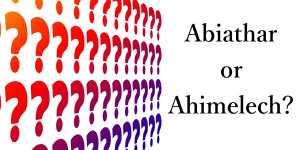The Bible is one unified whole which never contradicts itself. However, skeptics of the Bible often try to find contradictions between one passage and another. A noted example is an alleged contradiction between Mark 2:25-26 and 1 Samuel 21:1. The contradiction centers around the name of the high priest who gave David the showbread to eat. Here are the two passages:
- Mark 2:25-26. And [Jesus] said unto them, Have ye never read what David did, when he had need, and was an hungred, he, and they that were with him? How he went into the house of God in the days of Abiathar the high priest, and did eat the shewbread, which is not lawful to eat but for the priests, and gave also to them which were with him?
- 1 Samuel 21:1. Then came David to Nob to Ahimelech the priest: and Ahimelech was afraid at the meeting of David, and said unto him, Why art thou alone, and no man with thee?
In order to maintain the Bible’s integrity, we need to find only one possible solution to this apparent contradiction. In fact, as our brother Eric Lyons has pointed out, there are no fewer than three possible solutions (The Anvil Rings, 11-12).
One possible solution is Ahimelech and Abiathar are actually the same person. After all, Jethro was also called Reuel (Exodus 2:18; 3:1). Peter has various names in Scripture (Matthew 14:28; 16:16; 17:25; John 1:42).
A second possible solution comes from the fact that Jesus did not say that Abiathar was the priest who gave David the showbread, but merely that the event occurred “in the days of Abiathar.” Jesus may be saying merely that Abiathar was living at the time when Ahimelech assisted David, or was high priest at that time. After all, 1 Samuel mentions Abiathar the priest a number of times (1 Samuel 23:9; 30:7, etc.).
A third possible solution comes from the fact that Jesus calls Abiathar a high priest, whereas 1 Samuel 21:1 calls Ahimelech a priest. These were two separate offices during the Mosaic age.
We do not know which of these solutions is correct. But remember, our confidence in the integrity of the Scriptures in light of an alleged contradiction is contingent not upon finding an inescapable solution, but merely upon finding any plausible solution. For more solutions to alleged Bible contradictions, visit www.ApologeticsPress.org/AllegedDiscrepancies.aspx.

